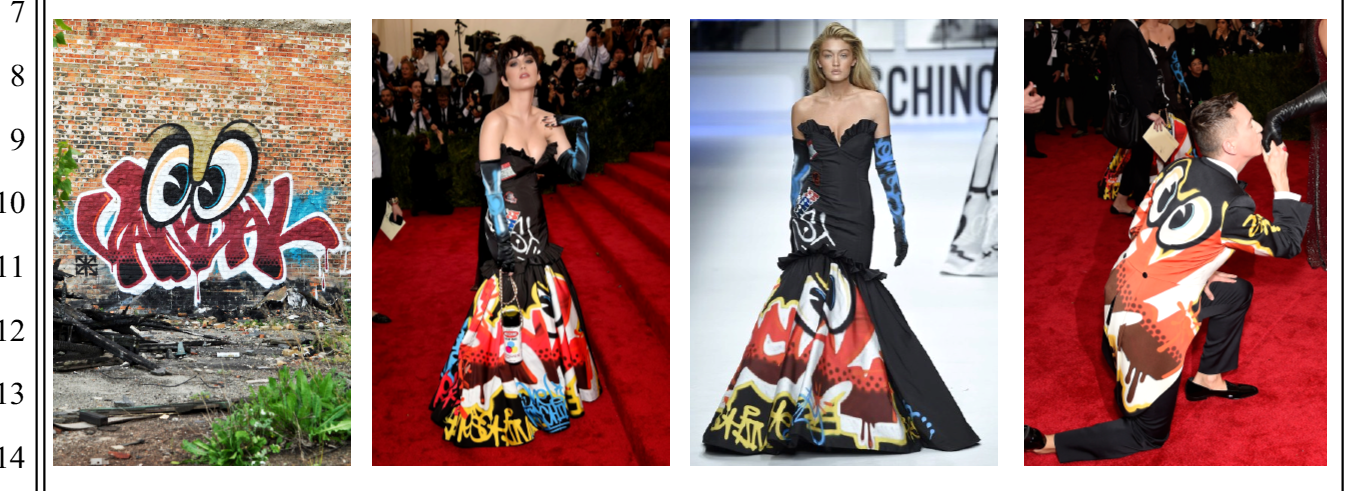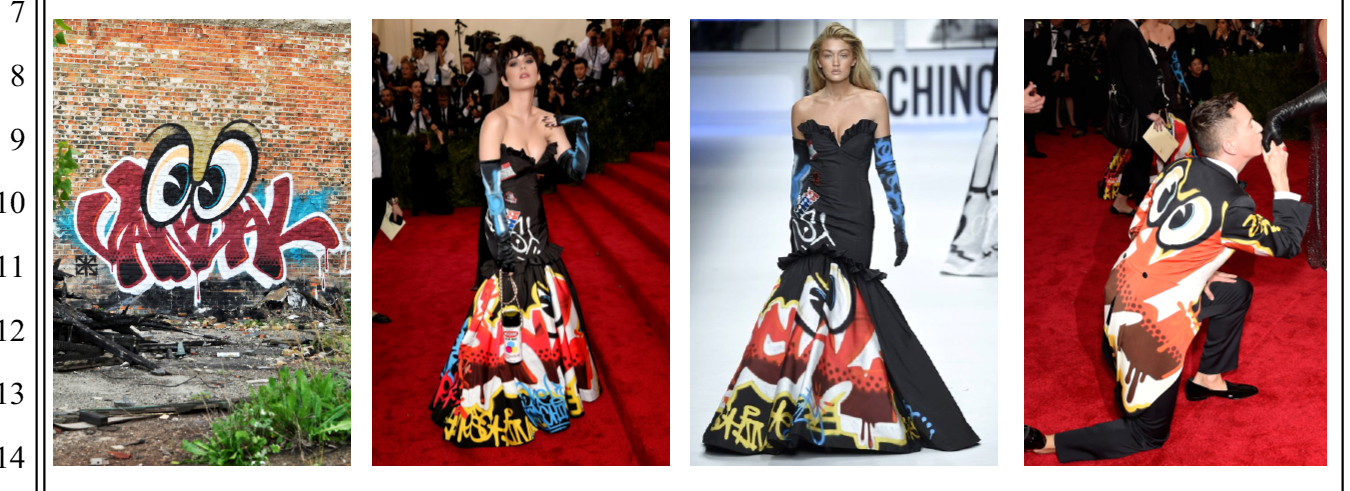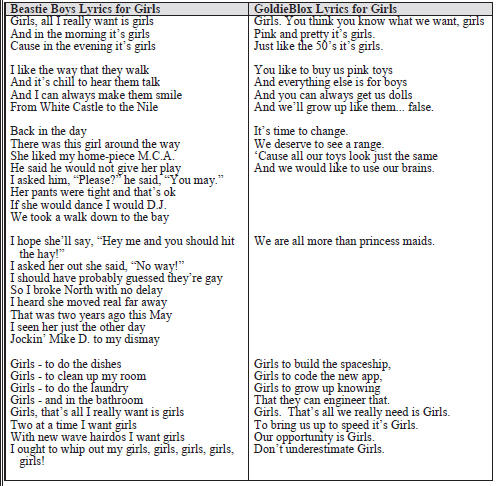After reports of a settlement proved premature, designer Moschino S.p.A. and its creative director Jeremy Scott have moved for summary judgment on the copyright claims filed last year by street artist Joseph Tierney, better known as “Rime.” The motion raises a number of arguments, but the most significant is the contention that Tierney’s work, as graffiti, is ineligible for copyright protection in the first instance. The view here is that defendants are mistaken about the eligibility question. And even if defendants can convince the court that they are right about the legal question of the availability of copyright for street art or graffiti, Tierney’s factual rebuttal on the question of whether had permission to create the art that was used in Moschino’s clothing designs makes it hard to imagine that they could convince the court that there are no material facts in dispute—the applicable standard for a motion for summary judgment. It will be very interesting too to see how the court grapples with questions about whether characters and symbols can be copyright management information (CMI) under the Digital Millennium Copyright Act (DMCA, 17 U.S.C. § 1202).
Is Graffiti Ineligible for Copyright Protection Just Because the Act of Tagging is Illegal?
Topics: copyright management information, DMCA, Rime, Graffiti Art, Copyright, Moschino, CMI
"Rime" Graffiti Case Against Moschino Survives Dismissal
Last year street artist Joseph Tierney, better known as “Rime,” sued designer Moschino S.p.A. and its creative director, Jeremy Scott, for a variety of copyright and trademark claims based on the alleged use of Rime’s works in certain fashion lines. The presiding court has denied Moschino’s efforts to have the claim dismissed in a decision that provides an important, if implicit, endorsement of the rights of street artists under the Copyright Act, and of a novel theory under the DMCA. While some reports stated that the case was now going to trial, it is not there quite yet. It will now presumably head into discovery for the exchange of facts and information to see if there is in fact a need for a trial later.
Topics: copyright management information, Katy Perry, DMCA, Rime, Copyright, Moschino, Lanham Act, Josep Tierney
Order Restored—Copyright Claim to Individual Performance in “Innocence of Muslims” Fails
The full en banc panel of the Ninth Circuit Court of Appeals has reversed the earlier three-judge panel decision concerning a claimed copyright in the notorious Innocence of Muslims film. The full panel rebuked—wisely—the earlier panel’s holding that Cindy Lee Garcia had an independent and enforceable copyright in her acting performance that would allow her to enjoin reproduction of the video (on YouTube, in particular). Garcia’s case failed both for threshold reasons of fixation, and larger issues of copyright and the First Amendment. The case is a sympathetic one, but the ruling that has now been overruled was an unworkable one that needed to be corrected. Many of the problems and ramifications of the earlier opinion that we have noted were echoed in the decision.
Topics: Copyright Act, Libya, Digital Millennium Copyright Act, DMCA, Youssef, YouTube, Innocence of Muslims, prior restraint, 17 U.S.C. § 106, Cindy Garcia, Copyright, First Amendment, Google, Benghazi, work for hire
Graffiti Litigation Update: Settlements and Procedural Wrangling
Back in October, we surveyed some developments in lawsuits over public art and protection available under copyright law in graffiti art. There has been some movement, and other developments, in these cases.
Topics: Ahol Sniffs Glue, Zero Theorem, Digital Milennium Copyright Act, David Anasagasti, Zappos.com Inc., Monty Python, Sara Bareilles, 15 U.S.C. § 1125(a), London, Terry Giliam, the Lanham Act, DMCA, Jason 'Revok' Williams, 17 U.S.C. §1202 et seq., Public Art, Graffiti Art, Romania, Vogue, Nordstrom Inc., Chicago, Amazon.com Inc., unfair competition, Robert Cavalli, Victor 'Reyes' Chapa, Jeffrey 'Steel' Rubin, Copyright, Buenos Aires, Litigation, Ocean Grown, Wal-Mart, New York Magazine, Graffiti, California Business and Professions Code § 17200, Staff USA Inc.
"Innocence of Muslims" Copyright Decision Against Google Could Put Distribution of Nearly Any Movie at Risk
Last year, the Ninth Circuit stood out amongst fair use decisions in its opinion in Seltzter v. Green Day, particularly in contrast to what has persuasively been dubbed the Second Circuit’s "know it when we see it" approach to transformativeness as annunciated in the Cariou v. Prince decision. By contrast, the potentially destabilizing effect of the Ninth Circuit’s highest profile copyright case in 2014 can scarcely be overstated. Unless and until the full court reverses a three-judge panel in Garcia v. Google, Inc., nearly every motion picture will be in peril of "infringement." The consequences for the First Amendment and for free expression would be devastating. Although it was not raised, expect fair use to come into play if the decision stands and the case heads back to the trial court. The film is clearly transformative precisely because the plaintiff argues that her performance was unknowingly changed in service of a message she found offensive.
Topics: Walter Sobchak, Copyright Act, Feist, Prince v. Cariou, Libya, Digital Millennium Copyright Act, DMCA, Youssef, YouTube, Innocence of Muslims, Green Day, Seltzter v. Green Day, Nothing Compares 2 U, prior restraint, 17 U.S.C. § 106, Cindy Garcia, Copyright, Prince, First Amendment, Google, Sinead O’Connor, Benghazi, work for hire
GoldieBlox Parodies the Beastie Boys and “Girls”—Fair Use is Clear, What About Queen’s “Bohemian Rhapsody”?
Coverage has exploded this week of a dispute between the Beastie Boys and a company called “GoldieBlox,” over the latter’s use of the song “Girls” in a video encouraging engineering and structural play toys for girls. Despite coverage focusing on whether Goldie Box copied the Beastie Boys’ song (which is undisputed, really, and thus beside the the point in this case), the fair use of the earlier song is clear: the new version is a parody of a leering anthem, intended to subvert inherent sexism into a message of empowerment. Curiously, however, the fair use in another video on the company’s site using the Queen song “Bohemian Rhapsody” seems less clear, but so far unnoticed.
Topics: License to Ill, Copyright Act, Campbell v. Acuff-Rose Music, Queen, Digital Millennium Copyright Act, DMCA, Adam Yauch, “Bohemian Rhapsody”, “Girls”, GoldieBlox, Copyright, MCA, Beastie Boys, Fair Use
Fair Use and DMCA Take Down—Lawrence Lessig Sues Over YouTube Use of “Lisztomania”
One of the lurking issues in the murky waters of copyright fair use is the takedown notice provision of the Digital Millennium Copyright Act of 1998 (the “DMCA”). The DMCA, codified at 17 U.S.C. § 512, implements two 1996 World Intellectual Property Organization treaties and absolves internet service providers (“ISPs”) who disable allegedly infringing content when notified by the copyright holder. In practice, this is known as a “takedown notice,” and serves to protect ISPs like YouTube from secondary infringement if a user posts something with infringing content (the easiest example being an unedited clip of a copyrighted movie). Copyright holders patrol the internet to various degrees, but § 512 gives the holders a tool to encourage compliance, and ISPs a way not to be sued out of existence.
Topics: World Intellectual Property Organization, ISPs, Copyright Act, Digital Millennium Copyright Act, DMCA, Viacom, YouTube, Eldred v. Ashcroft, Lawrence Lessig, Copyright, 1998 Sonny Bono Copyright Extension Act, Liberation Party Music Ltd., 17 U.S.C. § 512, Fair Use, Harvard Law School






